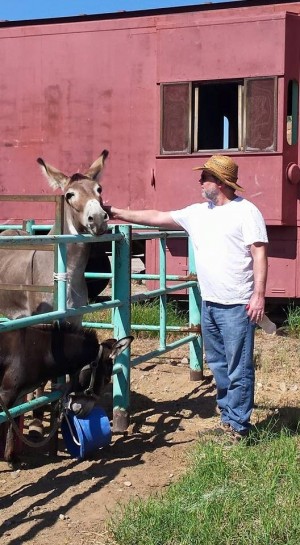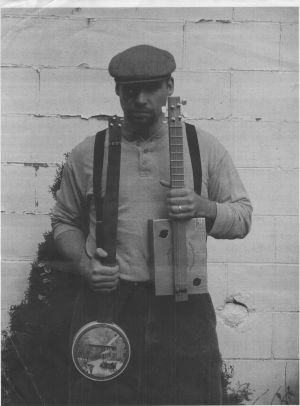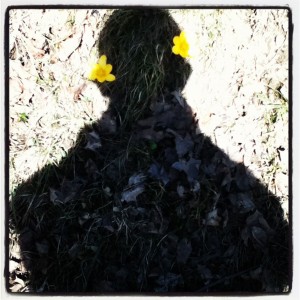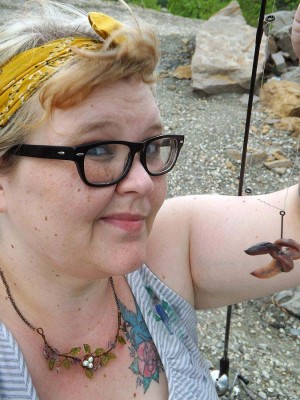All of a sudden Noelia wanted a Moringa tree. Moringa trees were the new thing, hot on the internet. You could make tea from the leaves, they would cure what ails you, a miracle plant, like a beanstalk to connect heaven and earth.
Noelia is Mexican, and one time when we were in Hermosillo we visited her uncle Raul. People rarely visited Raul, he lived in his dead mother’s house all by himself and he tended a little garden and was a bit of a mystery. He was friendly and smiled and showed us around the house, but not all the rooms. The house was small like almost all the houses down there and it had rough wood roof beams and a wood stove. The only furniture was a table in the kitchen. No tv, no bed, no computer. Raul didn’t need any of that stuff I guess. When it came time for us to leave he didn’t want us to leave, and he shook my hand and held it for a long time. He gave Noelia a little jar of Moringa seeds that he had gathered from the Moringa trees in his yard.
That jar sat in our cupboard for 3 years until the other day, when suddenly Moringa seeds were the hot new thing. Noelia took out the jar and shook it. It’s like a jar of miracles, she said. She prepared a spot in the dirt by our patio, buried a few seeds and watered them. She was very happy and beautiful in the sunshine.
The next day happened to be the fourth of July, which doesn’t mean a hell of a lot to Noelia, and even though I’m a white American it really doesn’t mean much to me either. How I got here to Tucson so far away from where I grew up in Illinois, and how Noelia got here so far away from her family, well that’s one of those things, long stories for another time. We watched some fireworks that our neighbors set off but it wasn’t very inspiring. It all felt kind of silly looking up into the sky and waiting for the bright lights that were never quite what you hoped they would be.
The next morning, and this is where it starts to get strange, there was a dog on our patio. We don’t have a dog, but there was a dog lying right in that spot of dirt where Noelia had planted her Moringa seeds. It was a male pitbull, tan, big, old and sad looking. Dogs hate the fourth of July, and apparently this one had been frightened by the fireworks and had run away from its home and ended up there on our patio. He didn’t look well at all, he looked hopeless and lost, lying in the newly turned dirt, which must have been cool in July desert heat. We approached him, carefully, but didn’t dare to touch him. He didn’t seem aggressive, but he didn’t wag its tail either. I put a dish of water out for him, and Noelia made him some scrambled eggs. His ribs poked out and there were scars on his body. He didn’t want the eggs, but drank about a half gallon of water, and then went to sleep.
He slept all day there, and later the eggs disappeared. He didn’t seem interested in leaving, he didn’t budge. Noelia was kind of irritated about her Moringa seeds, but she also felt sorry for the dog. She has a huge heart, and is not ashamed of it. The pain and confusion in a dog’s eyes sometimes, you know? He looked like the kind of dog that had not had much love in his life, didn’t have a lot to live for, probably never had. I wondered what his name was, no collar, no clue. I imagined he had lived in the same small yard all of his life, until this one noisy night of gunshots and firecrackers when he blindly ran, somehow escaped his fence and ran the streets. What was after him he’d never know.
The next day he was still there in that same spot of dirt. I went around the neighborhood and asked some people. Nobody knew anything. I didn’t want to call the pound, I knew they would kill him. Nobody would want this ugly guy. The thought of having a dog around wasn’t so bad really. But, still, I knew he would leave shit in our yard and eat a lot of food and be a responsibility for us. Maybe he would bite us one day. I try to be realistic, I try to be practical. But I could tell Noelia was already in love with him. She went to the store and bought a bag of dog food and we put it in a bowl and he ate it up. But he still didn’t warm to us, he just looked at us like he was asking us a question. He looked at us like he was sure we understood the question and simply refused to answer, which made him sadder than ever.
I wanted him, but I didn’t want him, which is the way I am with life. I knew how I was supposed to feel, but there was a part of me that just wanted that dog to disappear and leave me alone.
It rained that afternoon, one of those hell-fire monsoon rains we get here in the summer, and how that dog would ever sniff his way home after that I had no idea. A raindog, I thought. And I thought of Tom Waits’ song Raindog and how we loved that song in high school. As young people we had thought of ourselves as raindogs, all those friends of mine back in Illinois I had not seen in 25 years. We were so melodramatic and corny, thought we knew everything.
Noelia and I had to go to work the following day, and when we got home from work, the dog was gone. Noelia cried a little. I was sad too, but I was also relieved. Feelings are confusing. It’s ok, I told her, he probably found his way home. But she didn’t believe me. She’s not THAT gullible. I’ll make you a nice dinner, I told her, and we’ll watch the novela on tv. We always watched the Mexican novela which came on at 6 while we ate dinner. It was nice watching the drama of the characters’ lives, which became so terrible and then so perfect so quickly. How the women cried and were so beautiful, the men so handsome, and how they rose to their many sudden and unpredictable challenges. It was all very corny, but somehow we loved it and it helped.
I was putting the final touches on the enchiladas when Noelia got the phone call from her sister Rosita in Hermosillo. I looked at her face while she listened and thought, Oh, shit, what? The novela was about to start. Noelia’s beautiful Yaqui face went pale. How I loved those high cheekbones and that long black hair and those huge dark eyes. She hung up the phone and walked to the bedroom. I followed her, put my arm around her where she was sitting on the bed. Mi tio Raul esta muerto, she said. Her uncle Raul was dead.
Murdered. Someone had broken into his house and beat him on the head until he was dead. He had lain on his floor for 3 days in the Hermosillo heat naked until he was bloating and stinking. Noelia’s mother had found him.
I am a cold bastard, a cold white bastard, and I am not proud of it. But I was hungry, you know, and I got up and ate some enchiladas. Noelia didn’t eat anything. I watched the novela for 15 minutes but I couldn’t escape it, so I turned it off and went to bed.
We had to go to Hermosillo. God, how my wife missed her family. She missed Mexico so much, the family, the drama, the closeness, the shared life. We lived in Tucson, where we’d ended up. I missed my family too, but that was buried deeper, and I don’t talk about it.
We drove south, through the border at Nogales, past the tarpaper shacks on the hillsides, through the small pueblos, Imuris with its smoking carts of carne asada, Magdalena, that “magical town,” and Santa Ana with its copper wares and big stone statues and fountains. It was the quietest trip we had ever taken. “Everything is so green,” Noelia said. Her history, her beloved Mexico, green from the rains.
Everyone was at the tiny funeral parlor in Hermosillo, and there was very little parking. I finally inched in between two cars on a side street and prayed our new car would not be scratched or dented. Inside was the family, dozens of them, most of whom had not seen Raul in years. Nobody knew what happened, why it had happened, how somebody could beat an old man until he was dead and leave him lying naked like that, what he had done to deserve it. The lid was closed, of course. They said he was so bloated they had to put him into a plastic bag and it took three men to shove him into the casket. Noelia joined the family and I sat alone, the white ghost among them, listening to the Spanish which I only half understood. Most of them looked at me and wondered what I was doing there, where I had come from, what my story was, and I was wondering the same thing.
After a couple of hours we all pulled out and headed to the church. Again, parking was a nightmare. The church was hot as hell, which sounds corny, I’m sorry, but it’s true. The women fanned themselves and the men mopped their faces with colorful handkerchiefs. The priest said his thing, most of which I didn’t understand.
Cemeteries in Hermosillo are not like those in Tucson. There is no grass and hardly a tree and the graves are crammed together and the headstones are crumbling and many of the graves sunken in. I couldn’t believe how many holes were already dug and ready. There were so many we didn’t know which one was ours, or rather, which one was Raul’s. There were so many you had to be careful not to fall into one.
Right before they put the casket in the red ground, Noelia’s mother leaned over the casket and started crying, very loud and theatrical. It reminded me of a novela, corny, I thought, just for show. I am not proud of these thoughts. Someone asked me if it was true that gringos buried their dead standing up, feet down. I said, No, we bury our dead the same way you do, lying down. One day you’re here, the next you’re gone, that was the prevailing sentiment. I’m not sure if it does any good to realize that.
Two Mexican kids with bandanas over their faces lowered the casket into the ground and started to shovel the dirt. You know that sound of the dirt clods hitting the coffin? With their bandanas over their faces they looked like bandits. One of them had a Superman T‑shirt on.
Noelia stood very close to the burial and I stood back. It was late afternoon and the sun burned the side of my face. It was then that I had the strangest thought, which is so corny I hesitate to tell it. I thought of the dog that showed up on our patio, its sad lost eyes, and I thought that maybe somehow there was a connection between that dog and poor dead uncle Raul. I imagined the fear he must have felt when they broke into his house, and came for him, the horror of being beaten on the head and left to die, knowing no one would come to help him, knowing there was no escape. I wondered if he had tried to run. Why had he been so isolated from his family? Why had we not visited him or thought of him in 3 years, those Moringa seeds in the jar in the cupboard? I imagined him lying on his floor, feeling his life slipping away, his soul traveling through the dark night all the way to us there in Tucson, to appear to us in the form of that dog, with his eyes that looked so human, asking for help. Or maybe he just wanted to say goodbye? We were afraid to touch him, and we fed him scrambled eggs, and I wished he would just go away. And then he did.
There was a man selling raspadas at the cemetery, an old brown wrinkled man with a big smile. He scooped the ice into cups and poured the sweet syrup over them, strawberry, tamarind, vanilla… I watched him working under his little umbrella at his little cart, and thought, every day he was there, selling sweet ice among the dead.
The mourners slowly separated and started to leave and the old ladies urged everyone to get together again, and not just when someone died.
Rush hour traffic was insane in Hermosillo, and I cussed when I hit the potholes. Usually before we leave Mexico we will buy some seafood and tortillas, but this time I asked Noelia if she wanted to, and she said “No.”
When we got home to Tucson I would like to tell you that the Moringa plants were sprouting, but that would be corny, and anyway not true. There was nothing but the dark red dirt, patted down where the dog had lain. I don’t know how long it takes Moringa plants to sprout, so we’re still hopeful. Whether they can do all those things they’re supposed to be able to do, well, I’d like to believe it, you know. I really would.
 Mather Schneider is a cab driver who divides his time between Tucson and Mexico. He has 4 full length books out available on Amazon and has had poems and stories published in the small press since 1993.
Mather Schneider is a cab driver who divides his time between Tucson and Mexico. He has 4 full length books out available on Amazon and has had poems and stories published in the small press since 1993.
 Roy Bentley is the author of four books and several chapbooks. Poems have appeared in The Southern Review, Blackbird, Shenandoah, Indiana Review, Prairie Schooner, North American Review and elsewhere—recently, in the anthologies New Poetry from the Midwest and Every River on Earth. He has received a Creative Writing Fellowship from the NEA (in poetry), as well as fellowships from the arts councils of Ohio and Florida. He makes his home near the Jersey Shore.
Roy Bentley is the author of four books and several chapbooks. Poems have appeared in The Southern Review, Blackbird, Shenandoah, Indiana Review, Prairie Schooner, North American Review and elsewhere—recently, in the anthologies New Poetry from the Midwest and Every River on Earth. He has received a Creative Writing Fellowship from the NEA (in poetry), as well as fellowships from the arts councils of Ohio and Florida. He makes his home near the Jersey Shore.










